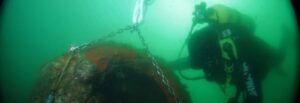Diving operations involving navies from different EU Member States are still almost impossible because there are no common European diving standards allowing such cooperation so far. This lack of interoperability has led to a serious shortage of rescue vessels and divers, which are indispensable assets in all national and international naval operations.
To enable cooperation and improve interoperability between Member States’ military diving squadrons, the EDA Naval Training Project team launched in 2012 a “Naval Training Support Study” (NTSS), focusing on three aspects: navigational training, naval warfare against mines and diving training. The aim of this study, the results of which were presented in 2014, was to provide an overview of existing capabilities, to propose possible common requirements, to derive deficiencies on the basis of a gap analysis and to propose recommendations to address them. With regard to the training of divers, the study made a number of recommendations, including establishing a doctrine on military diving (starting with air/navigator diving), establishing a shared diving regulation to meet operational needs, standardising training and operational qualification criteria and having a common certification process for diving centres. A follow-up to the NTSS study (phase 2) was commissioned in 2017 and completed in December 2017. It provided, inter alia, a comprehensive set of data and analysis of Member States’ national diving rules, a list of common requirements for ship divers and minimum qualification standards for military divers. The results were presented to the EDA Naval Training Project team in January 2018.
Based on the extended NTSS study and the conclusions of a diving workshop held in La Spezia (Italy) in September 2017, the EDA launched a new project in spring 2018 to design and implement a course module to harmonise European standards and practices for shipboard diving and shipboard rescue. The overall objective is the identification, recognition and mutual certification of EU common military diving standards.
More information
Access the full news







Leave a Reply